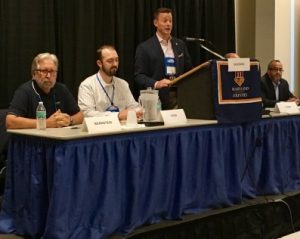
Nine Veteran-Owned Life Science Companies to Know in the BioHealth Capital Region
Editor’s Note: This post was originally published on July 1, 2020. With the goal of highlighting veteran-owned companies within our region, we will add additional companies as they are discovered. Please note the two new companies – Capsulomics and On Demand Pharmaceuticals- added at the beginning of this article.
Across Maryland and the BioHealth Capital Region (BHCR), state-level support for veteran-owned and operated life science businesses is strong.
This is evidenced by the rich and diverse tapestry of veteran-led life science organizations in the region that spans a number of disciplines, including genomics, regenerative medicine, lab equipment and support, testing and biorisk management services.
On this Veteran’s Day 2020, we celebrate BHCR veteran-owned life science companies that you should keep an eye on as we head into 2021.
Capsulomics, Baltimore, Maryland
Capsulomics is a service-connected disabled, veteran-owned biotechnology company that was founded in 2018 by CEO Daniel Lunz, a Johns Hopkins University (JHU) alum. Lunz served in the U.S. Marine Corps and is an Iraq combat veteran.
Capsulomics is a molecular diagnostics company focused on the early detection of upper gastrointestinal cancer and disease; the company was formed based on technology spun out of JHU. Capsulomics is currently developing early cancer and pre-cancer diagnostic tests to detect the future risk of cancer progression for patients diagnosed with the precancerous condition Barrett’s esophagus. Barrett’s esophagus is a condition caused by acid reflux where the esophagus’ lining thickens and becomes red. The test’s aim is to diagnose Barrett’s esophagus early when it can be treated and often cured.
Esophageal cancer kills approximately 16,000 people every year, making it the 3rd leading cause of cancer death in U.S. The current diagnostic standard of care, which is an endoscopy, is both invasive and expensive, which often causes people to put off the procedure until symptoms arise. According to Capsulomics, 75% of diagnosed cases come after the cancer has already spread.
Capsulomic’s test uses DNA biomarkers to identify Barrett’s esophagus early and is potentially a more convenient, less expensive, and more accurate diagnostic test than what is currently available.
The company expects to launch its first test to the market next year.
On Demand Pharmaceuticals, Rockville, Maryland
COL USA (r) Dr. Geoff Ling, a U.S. Army veteran, founded On Demand Pharmaceuticals (ODP) in response to his experiences in a combat hospital in Afghanistan. Dr. Ling was inspired to act when a wounded U.S. soldier needed a life-saving treatment and this treatment needed to be flown to the hospital from Germany. Dr. Ling realized that with a few simple ingredients he could have formulated the treatment onsite, and thus, ODP was born.
Dr. Ling is ODP’s CEO and he is also a Professor of Neurology and Attending Neuro-Critical Care Physician at the Johns Hopkins Medical Institutions; a Professor of Neurology, Director of the Neurotrauma Laboratory, and the founder of the Center for Military Clinical Neurosciences at the Uniformed Services University of the Health Science (USUHS). He was also the founding Director of Biological Technologies Office at Defense Advanced Research Projects Agency (DARPA).
ODP’s PoD (Pharmacy on Demand) Network is the world’s first distributed pharmaceutical manufacturing network. PoD is a machine about the size of a household refrigerator that can make starting materials, active pharmaceutical ingredients (API), and medicines into a finished pill or liquid product. PoD currently produces one medicine per machine, but ODP plans to launch “…A flexible PoD, capable of making multiple APIs and medicines in various dosages and forms utilizing state-of-the-art continuous manufacturing, 3D printing, and other technologies with a smaller footprint and a ‘green’ process” within the next two years.
ODP’s ultimate mission is to create a distributed network of made-in-America PoD’s creating life-saving medicines within “walking distance of every American.”
TruGenomix, Rockville, Maryland
TruGenomix is a service-disabled, veteran-owned precision behavioral health company pioneering the use of genomics in diagnosing and treating behavioral health disorders. The company’s genomic biomarker assay provides an objective assessment of an individual’s risk of developing post-traumatic stress disorder (PTSD).

The company was co-founded by Chief Executive Officer, Charles Cathlin, an Air Force Academy graduate who served in the Air Force and U.S. Public Health Service for 23 years and former Chief of Staff of the Defense and Veterans Brain Injury Center. Cathlin was also recently featured in the Military.com article, “A 9/11 Responder & Veteran Has a Better Way to Diagnose PTSD.” Recently joining the company as Chief Medical Officer is Dr. Anne Naclerio, who served in the U.S. Army for 30 years and held positions including Chief of Medical Readiness and Policy for the Army Surgeon General. In 2015 Dr. Naclerio, who established and led the Women’s Health Taskforce in the Army, published the first textbook on the unique needs of female service members in austere environments, entitled Women at War.
The company’s biomarker assay is the first of its kind on the market and integrates with other evidence-based tools as part of the TruGenomix behavioral health platform. The platform provides physicians with a “whole picture” view of their patients’ health, allowing earlier and more effective diagnosis and treatment.
TruGenomix’s mission is to provide solutions that improve the lives, health, and futures of approximately 400 million veterans (21 of whom commit suicide every day), 400,000 first responders, and nearly 700 million individuals worldwide suffering from PTSD.
Longhorn Vaccines and Diagnostics, Germantown, Maryland
Longhorn Vaccines & Diagnostics is a privately-held, veteran-run company that develops products for the molecular testing market was co-founded by current President Dr. Jeff Fischer, a marine infantry veteran. Dr. Gerald Fischer, Jeff’s father and the company’s other founder, is the company’s Executive Chairman and CEO; Gerald is an internationally recognized leader in pediatric and infectious disease care and research.
In the past few months, Longhorn has become one of the most important US companies responding to address the pandemic. As early as February the company was enlisted by the FDA to increase the production of its specialized storage tube product to help in the battle against COVID-19, and is now also actively engaged with state governments, hospitals, and labs to ramp up COVID-19 testing capabilities across the U.S. and the globe.
Read: Veteran Owned Diagnostics Supplier Tapped to Help alleviate COVID-19 Sample Collection Shortages
Since the pandemic began, Longhorn Vaccines and Diagnostics have won $225.8M in government contracts for COVID-19-related work, all of which are being provided by the Department of Homeland Security (DHS), making them the 25th largest recipient of COVID-19 Federal government contracts according to USA Today’s story. At the end of May, Coca-Cola and Longhorn also announced a large partnership to address a supply chain gap of COVID-19 test collection tubes to support the increasing testing needs of States.
Longhorn offers a variety of other products, including its PrimeStore® Molecular Transport Medium (MTM), which was developed in 2006 in preparation for a possible H5N1 global pandemic. MTM has classified as a De Novo (a brand new device) Class II product cleared by the FDA that is now being deployed for SARS-Cov-2 testing.
Longhorn’s PrimeStore MTM has demonstrated the ability to fully inactivate viruses in just seconds, stabilizing RNA/DNA for molecular testing and characterization. Because Longhorn’s MTM inactivates the virus, containment, which is mandated by CDC guidelines, is not necessary, and therefore the nasal and oral swab samples stored via PrimeStore MTM can be tested outside of containment facilities. PrimeStore MTM also eliminates the need for “cold chain” shipping. PrimeStore MTM is a product that breaks many of the current testing bottlenecks impeding more widespread coronavirus testing worldwide.
Over the last decade, Longhorn has also made significant investments in bringing its technology to the fight against tuberculosis (TB). TB, like SARS-CoV-2, is an infectious disease that requires containment processes. TB also disproportionately impacts underdeveloped countries where containment is challenging and where cold shipping costs can be prohibitive or simply not available. Longhorn’s work on TB has laid the groundwork for the remarkable and important contributions it is currently making to expand coronavirus testing capacity.
Theradaptive, Inc., Frederick, Maryland
Theradaptive, Inc. is a privately held biotechnology company that was founded in 2016 by MIT alum and Iraq war veteran Luis Alvarez. The company is focused on regenerative medicine technology. It is currently developing a therapeutic platform that induces targeted tissue repair. The platform’s indications include spinal fusion, soft tissue repair, local therapeutic delivery tissue patches, trauma repair, dental repair, and complex cartilage repair (Source: Theradaptive). The company is a Massachusetts Institute of Technology (MIT) spin-out that “is developing products based on a proprietary material-binding technology that allows for the targeted delivery of any therapeutic protein on the surface of implants or as depot formulations….The platform can also be used to deliver any biologic on the surface of implantable or injectable carriers.”
According to Alvarez, “The motivation for Theradaptive started when I saw fellow soldiers whose limbs were initially salvaged after a devastating injury but who eventually had to undergo amputation because the state of the art treatments at the time could not control bone repair. When you can’t heal bone in an extremity you end up with a useless limb that has to be amputated. I wanted to develop a way to regenerate these tissues in a controlled way. That is how Theradaptive was born.”
The company recently announced its “bone paint” technology called AMP2, which is a substance that can regrow bone in gaps at least 2 inches long, was nearing human clinical trials. If approved, AMP2 could provide more targeted and controlled treatments than the current liquid approaches to regrowing bone. In addition, Theradaptive entered an agreement at the end of 2019 with ORTHOREBIRTH Co., Ltd. to “…develop and commercialize THX-14, a combination product composed of Theradaptive’s proprietary material-binding biologic and ORTHOREBIRTH’s 510K-approved void filling material for the treatment of bone trauma, congenital skeletal defects with an option to extend into spinal fusion indications,” according to a joint press release.
Inspirion Biosciences, Frederick, Maryland
Founded in 1999, Inspirion Biosciences is a global biorisk management organization that “provides critical solutions covering the entire spectrum of your laboratory lifecycle from design, commissioning and start-up, through operations, laboratory relocation and decommissioning to address, identify and solve safety and security risks at each step before they arise.”
The organization works with academic research labs, biotech incubators, healthcare facilities, federal government programs, commercial facilities and the insurance industry, among others. Inspirion is a global company that has worked with clients across 30 countries.
CEO/owner and risk management expert Dr. Craig Reed, a former U.S. Army Captain, has spearheaded the company’s growth, overseeing approximately 50 Cooperative Bioresearch Projects (CBRs), 200 Biosafety & Biosecurity Threat & Vulnerability Assessments (T&VA) in 10 countries and the program management of six different U.S.-funded engagement programs valued over $70M. Inspirion has assisted the U.S. Centers for Disease Control and Prevention, the U.S. Department of Energy, the U.S. Department of State, among other agencies, and has served as an advisor to the White House.
Bridgepath Scientific, Frederick, Maryland
Bridgepath Scientific is a veteran-owned, small business that has been serving the life science community since 2006. For more than a decade the company has supplied high-quality laboratory equipment, both new and used, research supplies and products as well as laboratory services and lab design and relocation services to the life sciences community. The company has partnered with over 800 clients worldwide across government, industry, and academia during that time.
The company also offers contract research services as well. The company operates a small contract research lab and can offer proteomics, genomics and nanoparticle services. They work with PhD scientists to verify that our refurbished equipment works properly in a laboratory setting and leverages its equipment inventory — equipment that many small research labs could not afford to purchase just to bid on small projects like high performance liquid chromatography (HPLC) machines and -80° freezers — to perform work at a lower cost than other service providers.
U.S. Navy veteran Patrick Haley founded the company and currently serves as its President and CEO. Haley founded the company in 2006 and started operations out of Frederick’s Innovative and Technology Center (FITCI), graduating from the incubator program in 2008. Haley served as FITCI’s Chairman of the Board from 2003 to 2007 and is currently an advisory board member of The Maryland Small Business Development Center (SBDC).
Cogentis Therapeutics, Columbia, Maryland
Cogentis Therapeutics was Co-founded by its Navy veteran CEO Kent Werner. Werner leads a multidisciplinary team with the clinical, scientific, and business expertise needed to bring a groundbreaking therapy to patients with neurodegenerative diseases such as Alzheimer’s disease (AD) and frontotemporal dementia (FTD).
Cogentis Therapeutics is currently focused on a novel molecular target, cyclin-dependent kinase 5 (CDK5), which is linked to multiple neurodegenerative disorders. The company’s lead compound, CT-526, prevents disease progression and has high specificity without known toxicity in an AD preclinical model. Cogentis Therapeutics’ objective is to develop its lead small molecule CT-814 and its lead peptide in parallel for FTD (an FDA orphan indication), ultimately seeking co-development with a large pharmaceutical company followed by development for a second indication, AD.
UPDATED

Sanaria, Rockville, Maryland
Sanaria is a global, veteran-led organization with full R&D and robust translational science capabilities from early research through getting a product to cGMP manufacturing, assessment in Phase 1-3 clinical trials world-wide, and commercialization.
Sanaria is led by Dr. Stephen Hoffman, a retired Navy Captain who served for more than two decades. Thomas L. Richie, Sanaria’s Chief Medical Officer, is also a retired Navy Captain with over 20 years of service; and the company’s Deputy Chief Medical Officer, Preston Church, also served for nearly a decade in the Navy.
The company has developed a novel, innovative PfSPZ platform technology and has several malaria vaccine candidates in various stages of development and clinical evaluation. Sanaria’s lead malaria vaccine candidate is ready for Phase 3 trials in the US, Europe, and Africa, which have been delayed due to COVID-19.
Sanaria has spent more than a decade addressing the challenges of production, purification, cryopreservation, delivery, and administration of PfSPZ, and has an extensive domestic and international patent portfolio covering these innovations. Sanaria’s primary mission is to develop and commercialize vaccines that confer high-level, long-lasting protection against Plasmodium falciparum, the malaria parasite responsible for more than 95% of malaria-associated severe illness and death worldwide, and the malaria parasite for which there is the most significant drug resistance.
The company’s overall mission includes developing vaccines that prevent all human malaria. Sanaria is also working on a number of projects that are related to combatting COVID-19, including an antibody test and a potential vaccine. We detailed Sanaria’s unique, global public health success story in BioBuzz a few months ago.
- About the Author
- Latest Posts
Steve brings nearly twenty years of experience in marketing and content creation to the WorkForce Genetics team. He loves writing engaging content and working with partners, companies, and individuals to share their unique stories and showcase their work. Steve holds a BA in English from Providence College and an MA in American Literature from Montclair State University. He lives in Frederick, Maryland with his wife, two sons, and the family dog.





